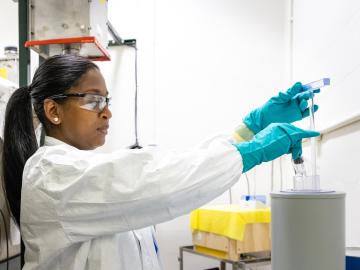
Filter News
Area of Research
News Topics
- (-) Advanced Reactors (3)
- (-) Artificial Intelligence (26)
- (-) Bioenergy (22)
- (-) Isotopes (11)
- (-) Security (3)
- 3-D Printing/Advanced Manufacturing (20)
- Big Data (10)
- Biology (29)
- Biomedical (7)
- Biotechnology (6)
- Buildings (14)
- Chemical Sciences (24)
- Clean Water (5)
- Composites (6)
- Computer Science (23)
- Coronavirus (4)
- Critical Materials (6)
- Cybersecurity (9)
- Education (3)
- Emergency (1)
- Energy Storage (21)
- Environment (43)
- Exascale Computing (15)
- Fossil Energy (2)
- Frontier (19)
- Fusion (9)
- Grid (16)
- High-Performance Computing (33)
- Hydropower (3)
- Irradiation (2)
- Machine Learning (15)
- Materials (59)
- Materials Science (16)
- Mathematics (2)
- Mercury (2)
- Microelectronics (2)
- Microscopy (7)
- Molten Salt (1)
- Nanotechnology (7)
- National Security (21)
- Neutron Science (32)
- Nuclear Energy (21)
- Partnerships (24)
- Physics (14)
- Polymers (4)
- Quantum Computing (12)
- Quantum Science (9)
- Simulation (29)
- Software (1)
- Space Exploration (4)
- Summit (9)
- Transportation (18)
Media Contacts

Nonfood, plant-based biofuels have potential as a green alternative to fossil fuels, but the enzymes required for production are too inefficient and costly to produce. However, new research is shining a light on enzymes from fungi that could make biofuels economically viable.
Oak Ridge National Laboratory scientists led the development of a supply chain model revealing the optimal places to site farms, biorefineries, pipelines and other infrastructure for sustainable aviation fuel production.

Growing up in suburban Upper East Tennessee, Layla Marshall didn’t see a lot of STEM opportunities for children.
“I like encouraging young people to get involved in the kinds of things I’ve been doing in my career,” said Marshall. “I like seeing the students achieve their goals. It’s fun to watch them get excited about learning new things and teaching the robot to do things that they didn’t know it could do until they tried it.”
Marshall herself has a passion for learning new things.

Climate change often comes down to how it affects water, whether it’s for drinking, electricity generation, or how flooding affects people and infrastructure. To better understand these impacts, ORNL water resources engineer Sudershan Gangrade is integrating knowledge ranging from large-scale climate projections to local meteorology and hydrology and using high-performance computing to create a holistic view of the future.

Oak Ridge National Laboratory scientists exploring bioenergy plant genetics have made a surprising discovery: a protein domain that could lead to new COVID-19 treatments.

Researchers at ORNL have developed a machine-learning inspired software package that provides end-to-end image analysis of electron and scanning probe microscopy images.

A team of researchers from ORNL was recognized by the National Cancer Institute in March for their unique contributions in the fight against cancer.

Oak Ridge National Laboratory, in partnership with the National Oceanic and Atmospheric Administration, is launching a new supercomputer dedicated to climate science research. The new system is the fifth supercomputer to be installed and run by the National Climate-Computing Research Center at ORNL.

Mickey Wade has been named associate laboratory director for the Fusion and Fission Energy and Science Directorate at the Department of Energy’s Oak Ridge National Laboratory, effective April 1.

A series of new classes at Pellissippi State Community College will offer students a new career path — and a national laboratory a pipeline of workers who have the skills needed for its own rapidly growing programs.


